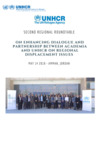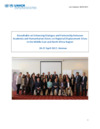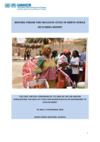Return of 2,400 Somali refugees leads to closing of third camp in Ethiopia
The voluntary return of more than 2,400 Somali refugees last week brings to more than 50,000 the number of voluntary repatriations last year and leads to the closing of a third refugee camp in Ethiopia.

ADDIS ABABA, Ethiopia, Jan. 2 (UNHCR) - The repatriation of thousands of Somali refugees from Ethiopia has continued at a steady pace, reflecting a more stable situation in parts of the east African country and leading to the closing of three of eight refugee camps.
Two convoys last week repatriated 2,412 people from Ethiopia's Daror camp to north-west Somalia, bringing the total number of refugees who returned home in 2001 to 50,216. The latest returnees received a nine-month food ration, plastic sheeting and blankets to help them restart their lives.
The Daror complex, which includes health clinics, schools, water systems and generators, and which once hosted 50,000 refugees, will be handed over by UNHCR to the local community.
Earlier last year, Teferiber and Dawarnaji camps were also closed.
Another estimated 67,000 Somalis who fled following the outbreak of widespread civil war a decade ago remain in five other camps in Ethiopia. More than half are expected to return home by June, but some 30,000 others from southern Somalia cannot be repatriated because the security situation in that part of the country remains unstable.
Related news and stories
Thousands of newly arrived Somali refugees in Ethiopia relocated to new settlement
Samira's Story
Drought brings life-threatening food shortages for refugees in Ethiopia
100,000 new Somali refugees arrive in Ethiopia in the past month, UN and partners are calling for urgent funding
UNHCR teams and partners rush assistance to some 100,000 newly arrived Somali refugees in hard-to-reach area of Ethiopia
As the Horn of Africa drought enters a sixth failed rainy season, UNHCR calls for urgent assistance
-

Regional Roundtable on the Role of Faith-Based Organizations in Addressing Displacement in MENA
7 Dec 2021 The purpose of the meeting was to explore the role of religion in promoting universal understanding and respect of human dignity, and faith-based responsibility towards displaced people and refugees. The main goal of the roundtable was to formulate commitments or pledges from religious actors in the region to refugees at a time of heightened tensions in some places towards the GRF. -

Second Regional Roundtable On Enhancing Dialogue and Partnership Between Academia and UNHCR on Regional Displacement Issues
7 Dec 2021 The second regional academia roundtable, co-hosted by UNHCR, the WANA Institute and the Columbia Global Center | Amman saw the participation of over 40 participants from various think tanks, academic institutions and research centers from across the MENA region. This gathering provided a platform for academia to frame its role in influencing policy, programs and discourse related to displacement in the MENA region in the context of major global processes including the Global Compact on Refugees (GCR) and the Comprehensive Refugee Response Framework (CRRF). -

Roundtable on Enhancing Dialogue and Partnership between Academia and Humanitarian Actors on Regional Displacement Crises in the Middle East and North Africa Region
7 Dec 2021 Organized by the UNHCR MENA Policy Unit, in partnership with the West Asia-North Africa (WANA) Institute, the first of its kind regional roundtable for academia brought together academics, think tanks, research centers, and university professors from 12 countries to discuss their role in humanitarian interventions. The discussions brought to light challenges that academia faces, and generated concrete suggestions and good practices in relation to solutions. -

The First MENA Roundtable on the Role of Art and Culture in Addressing Displacement
7 Dec 2021 The roundtable was the first of its kind in the region and aimed to discuss how artists and cultural actors can shape public narratives and expand the space for constructive dialogues, particularly in relation to social cohesion between refugees and host communities. The roundtable provided a platform for over 50 artists and cultural actors to frame their role in issues related to displacement in MENA and share successful practices of promoting refugee inclusion. -

Mayors Forum for Inclusive Cities in North Africa Outcomes Report
7 Dec 2021 The Mayor's Forum for Inclusive Cities in North Africa brought together mayors, municipality authorities and civil society organisation representatives from major refugee hosting cities in Egypt, Morocco, Algeria, Libya, Tunisia and Mauritania. The forum was hosted by UNHCR under the supervision of the Mayor of Tunis and aimed to build a common platform of good practices and learning among cities and with UNHCR, on the challenges and opportunities facing sustainable policy design and operational for inclusive cities. -
Briefing to the United Nations Security Council
7 Dec 2021 -

Evaluation of UNHCR's engagement in humanitarian-development cooperation Sep 2021
7 Dec 2021 This report contains the findings of an evaluation of UNHCR's engagement in humanitarian-development cooperation (Sep 2018 - March 2021). The evaluation was commissioned by UNHCR due to recent high-level policy developments and initiatives, such as the 2016 Global Compact on Refugees, in order to support a more comprehensive response to displacement, involving both humanitarian and development actors. Attachments: Executive Summary, Management Response and Annexes (.zip) -

Age Gender and Diversity Tip sheet - Helping to ensure AGD inclusive pledges and good practices for the GRF (ENG, 2021)
6 Dec 2021 This Tip Sheet builds on the progress made at the 2019 Global Refugee Forum (GRF) to help ensure pledges address gaps related to age, gender, and diversity (AGD), including disability, in refugee responses. -

Anna Drijver
Anna Drijver has been supporting UNHCR since 2018.
